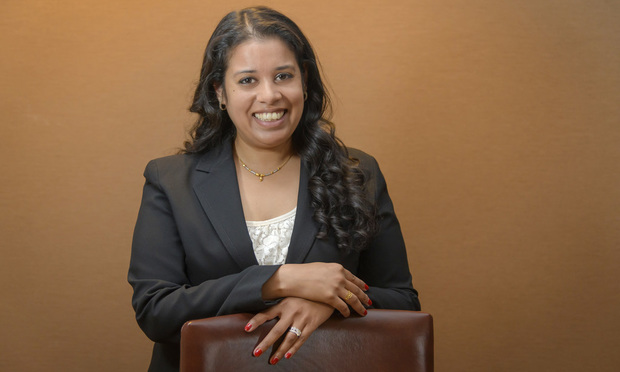Neelima Vanguri Named 2018 Attorney of the Year
Neelima Vanguri was named The Legal's 2018 Attorney of the Year on Wednesday night at a celebratory event in Philadelphia, honored for her pioneering work on the transgender rights case Blatt v. Cabela's Retail.
June 28, 2018 at 12:27 PM
6 minute read
 Neelima Vanguri. (Photo by Nanette Kardaszeski)
Neelima Vanguri. (Photo by Nanette Kardaszeski)
Neelima Vanguri was named The Legal's 2018 Attorney of the Year on Wednesday night at a celebratory event in Philadelphia, honored for her pioneering work on the transgender rights case Blatt v. Cabela's Retail.
In Blatt, Vanguri became the first attorney in the country to argue that a company can violate the Americans with Disabilities Act by denying a transgender person use of a bathroom that corresponds with the gender they identify with. Vanguri successfully convinced the U.S. District Court for the Eastern District of Pennsylvania that her client, Kate Lynn Blatt, a transgender employee of outdoor retailer Cabela's, should be allowed to move forward with a claim of Americans with Disabilities Act discrimination based on the condition of gender dysphoria. The case eventually settled, cementing the district court's ruling that gender dysphoria is a debilitating condition that is covered under the ADA.
Vanguri accepted her award at The Legal's Professional Excellence Awards dinner on Wednesday at the Crystal Tea Room in Center City.
Addressing the crowd, Vanguri said that calling Blatt to inform her of the court's historic ruling was “one of the most amazing moments in my career.”
“She's so proud that her name is on this decision,” Vanguri said.
Vanguri also thanked her firm, Sidney L. Gold & Associates in Philadelphia, and its principal shareholder, Sidney Gold, for their support in pursuing what initially appeared to be a longshot claim.
“I'm very lucky to work for a firm and an attorney who believes very strongly in transgender rights,” she said. ”I think … at a lot of firms, if two associates went to their boss and said, 'Hey, we want to bring this … constitutional challenge to the ADA, which requires us to file a constitutional question to the attorney general of the United States and oh, by the way, no one's ever done this in the United States before,' the answer would have been a resounding 'No.' But that wasn't the case.”
As legal battles over transgender rights rage in courtrooms across the country, the Blatt case stands out among the pack for its unique and potentially game-changing legal strategy.
While the ruling was widely lauded as a landmark victory for transgender rights and, as one advocate put it, ”a huge step forward for the transgender community,” getting there was no easy task. After all, unique theories also present unique challenges.
“Just being the first to assert any type of claim is difficult,” Vanguri said in an interview with The Legal following her nomination as an Attorney of the Year finalist earlier this year. “We don't have a bank of potential claims or briefs to draw from. The first challenge was figuring out how to assert this constitutional challenge.”
Blatt sued Cabela's under the ADA for allegedly forcing her to use the men's bathroom at work, claiming her colleagues called her “ladyboy,” “fag,” ”freak” and “sinner.”
Gender dysphoria, or GD, is a condition in which people who identify with a gender different from their birth gender experience physical and psychological distress.
Cabela's argued exclusions from the ADA for certain categories—such as gender identity—meant that Blatt's claims should be thrown out.
Those exclusions emerged in the summer of 1989, when U.S. senators debating the ADA decided to bar from its protections behavior they deemed immoral, including “transvestism, transsexualism, pedophilia, exhibitionism, voyeurism, gender identity disorders not resulting from physical impairments, or other sexual behavior disorders,” according to the text of the law.
In her lawsuit, Blatt questioned the constitutionality of such exclusions.
In a May 18, 2017, opinion, presiding U.S. District Judge Joseph F. Leeson of the Eastern District of Pennsylvania sided with Blatt, reasoning that gender dysphoria is not simply a person's identification with a specific gender, but a debilitating condition that is covered under the ADA.
“It is fairly possible to interpret the term gender identity disorders narrowly to refer to simply the condition of identifying with a different gender, not to exclude from ADA coverage disabling conditions that persons who identify with a different gender may have—such as Blatt's gender dysphoria, which substantially limits her major life activities of interacting with others, reproducing, and social and occupational functioning,” Leeson said.
The judge also said classifying gender dysphoria as a debilitating condition side-steps having to deal with the constitutional question.
He continued, “Because this interpretation allows the court to avoid the constitutional questions raised in this case, it is the court's duty to adopt it.”
Whenever a constitutional question hits the courts, the pertinent federal agency—in this case the Department of Justice—has to be notified so that it can weigh in. Vanguri said she dealt with two attorneys general in the case, first Eric Holder and then Loretta Lynch.
Holder essentially gave no opinion about whether Blatt could bring an ADA claim, and instead said she should proceed under Title VII of the Civil Rights Act, dealing with sex discrimination. Vanguri said she had to go back to Holder and tell him Title VII wasn't good enough because it lacked the extra remedies, including for failure to accommodate, that the ADA provides.
Time wore on and eventually Holder left office. It then was up to Lynch to address the issue. Vanguri said Lynch advised her that while she should avoid the constitutional question, there was room for Blatt to move forward with ADA claims.
The rest is history.
“I felt that it was life-changing,” Vanguri said of Leeson's resulting decision. “I really love what I do and helping the greater good, but very rarely do you get the opportunity to create civil rights, so the opportunity to do something like that is extremely profound to me.”
But during her acceptance speech last night, Vanguri also made clear that her work is far from finished and pledged to “fight to continue to expand civil rights at a time when we desperately need it.”
Also honored at the ceremony were the two Attorney of the Year finalists: Sozi Tulante, who, as Philadelphia city solicitor, took on several high-profile cases last year and transformed the Law Department by emphasizing affirmative litigation, and Robert Mongeluzzi, who, as lead plaintiffs attorney in the Salvation Army building collapse case, was a major force throughout the longest trial in Philadelphia history, which settled in February 2017 for $227 million, an amount plaintiffs counsel said was the largest-ever personal injury settlement out of a Pennsylvania state court.
This content has been archived. It is available through our partners, LexisNexis® and Bloomberg Law.
To view this content, please continue to their sites.
Not a Lexis Subscriber?
Subscribe Now
Not a Bloomberg Law Subscriber?
Subscribe Now
NOT FOR REPRINT
© 2025 ALM Global, LLC, All Rights Reserved. Request academic re-use from www.copyright.com. All other uses, submit a request to [email protected]. For more information visit Asset & Logo Licensing.
You Might Like
View All
Pa. Defense Firm Sued by Client Over Ex-Eagles Player's $43.5M Med Mal Win
3 minute read


Trending Stories
- 1Arguing Class Actions: With Friends Like These...
- 2How Some Elite Law Firms Are Growing Equity Partner Ranks Faster Than Others
- 3Fried Frank Partner Leaves for Paul Hastings to Start Tech Transactions Practice
- 4Stradley Ronon Welcomes Insurance Team From Mintz
- 5Weil Adds Acting Director of SEC Enforcement, Continuing Government Hiring Streak
Who Got The Work
J. Brugh Lower of Gibbons has entered an appearance for industrial equipment supplier Devco Corporation in a pending trademark infringement lawsuit. The suit, accusing the defendant of selling knock-off Graco products, was filed Dec. 18 in New Jersey District Court by Rivkin Radler on behalf of Graco Inc. and Graco Minnesota. The case, assigned to U.S. District Judge Zahid N. Quraishi, is 3:24-cv-11294, Graco Inc. et al v. Devco Corporation.
Who Got The Work
Rebecca Maller-Stein and Kent A. Yalowitz of Arnold & Porter Kaye Scholer have entered their appearances for Hanaco Venture Capital and its executives, Lior Prosor and David Frankel, in a pending securities lawsuit. The action, filed on Dec. 24 in New York Southern District Court by Zell, Aron & Co. on behalf of Goldeneye Advisors, accuses the defendants of negligently and fraudulently managing the plaintiff's $1 million investment. The case, assigned to U.S. District Judge Vernon S. Broderick, is 1:24-cv-09918, Goldeneye Advisors, LLC v. Hanaco Venture Capital, Ltd. et al.
Who Got The Work
Attorneys from A&O Shearman has stepped in as defense counsel for Toronto-Dominion Bank and other defendants in a pending securities class action. The suit, filed Dec. 11 in New York Southern District Court by Bleichmar Fonti & Auld, accuses the defendants of concealing the bank's 'pervasive' deficiencies in regards to its compliance with the Bank Secrecy Act and the quality of its anti-money laundering controls. The case, assigned to U.S. District Judge Arun Subramanian, is 1:24-cv-09445, Gonzalez v. The Toronto-Dominion Bank et al.
Who Got The Work
Crown Castle International, a Pennsylvania company providing shared communications infrastructure, has turned to Luke D. Wolf of Gordon Rees Scully Mansukhani to fend off a pending breach-of-contract lawsuit. The court action, filed Nov. 25 in Michigan Eastern District Court by Hooper Hathaway PC on behalf of The Town Residences LLC, accuses Crown Castle of failing to transfer approximately $30,000 in utility payments from T-Mobile in breach of a roof-top lease and assignment agreement. The case, assigned to U.S. District Judge Susan K. Declercq, is 2:24-cv-13131, The Town Residences LLC v. T-Mobile US, Inc. et al.
Who Got The Work
Wilfred P. Coronato and Daniel M. Schwartz of McCarter & English have stepped in as defense counsel to Electrolux Home Products Inc. in a pending product liability lawsuit. The court action, filed Nov. 26 in New York Eastern District Court by Poulos Lopiccolo PC and Nagel Rice LLP on behalf of David Stern, alleges that the defendant's refrigerators’ drawers and shelving repeatedly break and fall apart within months after purchase. The case, assigned to U.S. District Judge Joan M. Azrack, is 2:24-cv-08204, Stern v. Electrolux Home Products, Inc.
Featured Firms
Law Offices of Gary Martin Hays & Associates, P.C.
(470) 294-1674
Law Offices of Mark E. Salomone
(857) 444-6468
Smith & Hassler
(713) 739-1250





